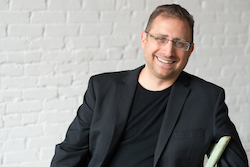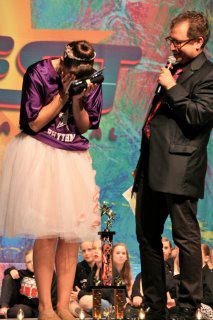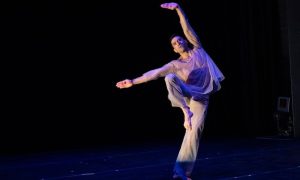In life, how often do we slow down and think about why we do what we do? How much does the answer to that question influence how we actually go forward in the world? Michael Ian Cedar, president and founder of The Legacy of You, guides dance studios to look at these bigger questions, and have that shape what they do. On a wider scale, his business offers leadership and personal growth consultancy for creative enterprises. It’s dedicated to inspiring people to be “the best version of themselves and leave behind a positive legacy…pursue your passions productively!”

Michael Ian Cedar.
Cedar has a background in theater, which led him to inspirational speaking — and eventually producing — in the dance competition world. A few years ago, he realized he wanted to take his passion for personal growth to a more concrete place, as well as combine it with his experience and expertise in the dance competition world. So he decided to create his own coaching business. He still often works with dance competitions and studios (along with many other creative businesses, including the makers of Fortnight, the Sesame Network and the World Economic Forum).
Cedar underscores that dance can truly be a vehicle for a larger mission. Most studio owners know this, consciously or unconsciously; they have clear, visible mission statements and/or begin the enterprise with a specific mission in mind. This mission could be to keep youth off the streets and away from destructive behaviors, to preserve the legacy of dance art, to honor a higher power and more.
Cedar encourages studio owners to ask themselves if they are applying the spirit of their mission when they bring work to competition. He describes how he’ll ask studio owners and teachers these sorts of questions, and they’ll say things like, “I never thought of that!” Yet most studios start out with a mission, even if it’s in the form of a passion that founders want to fulfill — keeping kids off the streets, preserving the legacy of dance art.
So in some cases, it seems, Cedar pushes studio owners and teachers to remember what their founding mission was, and what it continues to be. These conversations look and feel a little different in each case; Cedar says that “every client is different, with different needs based on where they are in clarity or execution on their missions/vision.” He acknowledges he’s never owned or run a dance studio, and has a good deal of empathy for people in the industry. He won’t tell them what to do, he asserts; rather, he’ll say what he sees. Cedar believes that as somewhat of an outsider to the whole studio “scene”, he can bring unique and helpful perspective in these conversations.
With competing, these kinds of questions turn to “why do you compete?” Cedar discusses how the desire to win could become all-encompassing and “cloud one’s original intention”. He describes how the competitive environment naturally triggers flight/fight/freeze response. In an anthropological and evolutionary psychology lens, it goes back to one’s tribe facing another. One can also feel like their creative work is being attacked. All of this can bring out the worst in us, he believes. On the other hand, it can also bring out some of the best in us — a collaborative spirit, a desire to learn from others and an ability to be inspired by others. What can make the difference between being on one end of the spectrum or the other is having “clarity of intention” and “self-awareness when one is falling away from one’s intention,” Cedar asserts.
All of this considered, the truth is that many studios out there want to win at competitions. The important question becomes, “Well, what do you uniquely bring, guided by your intention and mission?” A desire to win may likely come from fears of losing students, retention perhaps suffering from them being let down or parents being dissatisfied. That may very well be understandable; the number of dance studios out there has grown by 2.1 percent from 2014-2019. Cedar believes, however, that success — however one may define it (which is another important question) — comes with focusing on impact. In terms of sustainability and growth, focus on your unique impact, and the money will come.

Michael Ian Cedar.
With those running the competitions themselves, many of these same truths apply. For instance, regarding intention and mission, do you want to lift up young dance artists from all types of backgrounds, through exposure and scholarships? Do you want to offer a space for young dancers to learn from each other? Do you want to push dance art to the best it can be? These are the kinds of passions that one can deliver through the vehicle of dance competitions.
With fears of risking reduced profits, one could come back to Cedar’s belief that the money will come if one first focuses on impact. It’s possible, and being done out there; Cedar cites a few dance competitions that are mission- and intention-based: StarQuest by Steve and Kathy Wappel (“Provide dancers with the courtesies a professional dancer receives”), Kids Artistic Review by Rick Lands (“Making performing an environment for dancers at any level to perform”) and Tribute by Darin Troglia (“Dance with intention to honor another person”).
As first concrete action steps, everyone can engage in these conversations on mission/intention, on social media and in face-to-face conversations (in groups and one-on-one). Cedar points to allowing oneself to show vulnerability as a key helpful part of these conversations. We all have room to grow, and all struggle in some way or ways. Discussing those things allows us to support one another in our unique needs and desires. So supported, we’re in a better position to work toward fulfilling our individual missions out there.
With that accomplished, dance has incredible potential to do good out there in the world. Yet it takes commitment to passion to make it happen. Each studio, each competition, each teacher can do their part by offering what they uniquely can. Cedar is doing his part by guiding these players to find what that is and how they can make it a reality.
For more information on Michael Ian Cedar and The Legacy of You, visit thelegacyofyou.com.
By Kathryn Boland of Dance Informa.















